What's Happening?
Revel has announced the successful raising of $30 million across two funding rounds to support the development of its hardware control software platform. Thrive Capital led the Series A round with a $23.1
million investment, while the seed round was supported by Felicis Ventures, Abstract Ventures, and other investors. Revel's platform aims to address the challenges faced by industries such as aerospace, automotive, and energy production, which have relied on outdated software for controlling physical systems. The platform combines an intuitive command/control interface, a specialized programming language, and a high-performance runtime environment to accelerate hardware development.
Why It's Important?
The funding secured by Revel is crucial for advancing its mission to modernize software used in controlling physical systems across essential industries. By providing a more efficient and robust platform, Revel can help these industries overcome innovation barriers and safety risks associated with outdated software. The investment will enable Revel to enhance its platform's capabilities and bring it to market sooner, potentially transforming how hardware is developed and controlled. This could lead to safer, more reliable products and faster innovation cycles, benefiting both companies and consumers.
What's Next?
With the new funding, Revel plans to accelerate its development efforts and expand its market presence. The company is likely to focus on refining its platform's features and increasing its adoption across various industrial sectors. As Revel continues to grow, it may seek additional partnerships and collaborations to further enhance its platform's capabilities and reach. The success of Revel's platform could also prompt other companies to invest in similar technologies, driving competition and innovation in the hardware control software market.
Beyond the Headlines
Revel's platform could have long-term implications for the industrial sector, potentially leading to a shift in how companies approach hardware development and control. The platform's ability to streamline processes and reduce errors may encourage industries to adopt more advanced technologies, fostering a culture of innovation and continuous improvement. Additionally, the platform's impact on safety and reliability could lead to regulatory changes and new standards for software used in controlling physical systems.









